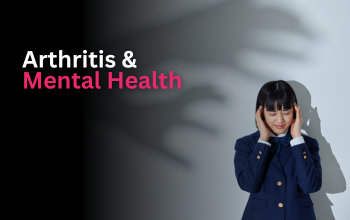Fatigue: An Unwelcome Symptom of Rheumatoid Arthritis
 I recently read an article about fatigue that I would like to share, it is the best explanation that I have found, of what I experience with my fatigue.
I recently read an article about fatigue that I would like to share, it is the best explanation that I have found, of what I experience with my fatigue.
The article is called “Fatigue: RA’s Inconvenient Truth” by Sara Nash, Health Guide, and was published April 29, 2009*. Here are a couple of excerpts:
“Sometimes, you just know it’s going to be one of those days. You have a million things planned that you need to get done, but you wake up that morning, and right away you know your RA has a different agenda….You go through the motions telling yourself you’ll feel better as the day goes on. You get ready. Maybe you even make it to work, but like a tire that has been punctured, what little energy you had steadily seeps out until suddenly, you are so profoundly tired that you can’t even hold yourself up in your chair any longer. And that’s it – your day is over. Off to bed you go.
Sound familiar?
“Or how about this: You don’t feel great, but you’ve felt worse, so you try to get on with things. Mentally, your mind is active and alert, aware of all that needs to be done, but your body feels like it is moving through a thick fog of inertia that you just can’t shake. You try to get extra sleep. You eat especially well. You exercise, hoping to burn off the fog fatigue surrounding you, but to no avail. You’re stuck in it until it decides to lift, which could take days or even weeks. Too bad if you had other plans.
For me, even though most of my other symptoms are under control, I still find myself struggling to deal with fatigue. There seems to be no way to beat it, either.”
Fatigue is subjective and personal. It is a feeling of both physical and mental weariness that can be severe and overwhelming for people with rheumatoid arthritis (RA). There is a difference between acute (short-term) and chronic (long-term) fatigue. Most people without a chronic disease can feel tired after a long day but recover after a night’s rest. People with RA experience fatigue day after day irrespective of their activity or how much rest they get. In fact, fatigue is one of the principal symptoms of RA, along with pain, stiffness and loss of function.
For me, the term ‘tired’ doesn’t cut it. I get totally exhausted, can barely move in the bad times and feel like I’m dragging a huge weight in the good. For me this is a constant battle that I fight every day. The fatigue of RA is a weariness that rest cannot cure. Over 90% of RA patients report fatigue as a clinical symptom. It is counted second only to pain as the greatest difficulty of living with RA.
What causes fatigue?
There are a number of causes all of which can contribute to the feeling of fatigue. The disease process (chronic inflammation of joints and other tissues) is undoubtedly the main cause. Fatigue is also more prominent in the early stages of the disease, and is associated with the higher levels of inflammation. As the disease is controlled (inflammation decreases), and as people adapt with behavioral changes, fatigue becomes less prominent. This has been my experience as I feel less fatigue now than I did at the disease’s beginnings, almost 30 years ago. Pain, unremitting pain can also play its part. I find pain wears me down and make me exhausted. It also wakes me up at night causing a poor, disturbed sleep. Certain drugs that I take for my arthritis may also make fatigue worse. Painkillers may cause drowsiness and interfere with my concentration; I call this my ‘brain fog’.

RA Fatigue – 9 ways I have learned to cope – changing my behaviors:
Getting quality SLEEP:
Sometimes I can be in bed for hours but still wake up tired. Here is a list of strategies I have tried:
- Keep pain-free as much as possible, take pain medication just before bedtime,
- Make sleep a priority,
- Have a comfortable sleeping area,
- Temperature not too warm or cool, keep fresh air in the room,
- Comfortable bed,
- Dark and quiet room,
- Use your bed only for sleeping; avoid eating, reading, and watching TV in bed,
- Do any exercise routine early in the day rather than at bedtime,
- Put yourself in the mood to sleep: relaxation techniques (breathing exercises, stretching, meditation), quiet restful music, drinking warm milk, and good sleep posture.
- When in bed, relax. Try not to think about issues that cause worry. Rather write them on a piece of paper and leave it elsewhere.
- Keep to a regular schedule. Go to bed and wake up at about the same time every day and aim for at least 8 hours per night
- Be careful about sleeping too much as this could lead to or be a symptom of depression
Even doing all of these things, I found I still had problems, so I sought help from my doctor and was diagnosed with sleep apnea (A condition that briefly stops your breathing through the night, each interruption wakes you for a moment but you are not aware of it, and this all results in sleep deprivation). I now use a CPAP machine every night and this has made quite a difference for me. I don’t snore anymore (my husband really appreciates this). Instead of waking up 4 to 5 times a night, I sleep right through. I wake up now much more refreshed and ready for my day. Other things I avoid before bedtime are: alcohol, certain medications in evening (e.g. diuretics, steroids), smoking (luckily I haven’t smoked in a very long time), stimulation (stress, late evening exercise, television), catnaps, chocolate, caffeine, sugars, and spicy heavy late night meals.
EATING well and often:
RA and many of the medicines prescribed for it tend to curb normal appetite. I have found that I am more fatigued if I don’t watch what I eat (as in eating too little or eating the wrong foods). I have become careful to eat a balanced diet, which helps keep blood sugars in normal range and prevents that sluggish feeling when my blood sugar drops. To keep my energy up, I also make it a point of always eating breakfast, eat protein or protein substitute at every meal, and eat three meals, as well as several snacks during the day. Another important dietary concern is to eat a healthy balance of fruits, vegetables, whole grains, and low-fat dairy products. Eating fish or taking fish oil supplements may help too. I have heard that there is some evidence that the omega-3 fatty acids in fish reduce RA stiffness and inflammation.
The bonus of eating well is it can help control my weight. Being overweight or obese is hard on my joints, and it can make my RA less likely to go into remission and my fatigue goes unchecked.
PACING my activities:
I try to arrange my day to accommodate my RA symptoms. I structure my day so that I can minimize how much my symptoms interfere with what I do each day. Everyone has busy schedules, so I now take time for me, by taking naps or giving myself permission to take brief periods of rest throughout the day. I also AVOID stress. Taking things as they come and realizing very often there is nothing I can do about it anyway, relieves me of worry and stress. This pacing conserves my energy. I am better able to prepare for events in my life, which allows me time to ‘recover’ or ‘catch-up’.
Staying ACTIVE:
Big news – exercise is so important. It helps to strengthen my muscles around my joints, improves joint function and flexibility, and over time, makes physical activity easier. It also reduces my fatigue and gives me more energy. When I began an exercise routine, I had to start slowly. Some days I don’t do as much as I would like depending on how I feel but I don’t let my RA stop me from exercising. Tomorrow is another day.
Using ASSISTIVE DEVICES:
The simplest everyday tasks can seem like monumental chores when my joints feel weak and sore and I find this uses more energy. Using assistive devices makes those tasks much easier. My favorites are a jar-opener, a long shoehorn, splints for my wrists, orthotics in my shoes, and my ‘high’ toilet seat. A wide variety of tools and devices are available for people with RA. I found most through the Arthritis Society, Rehab stores, and Occupational Therapists.
DISTRACTION:
Sometimes I just have to take my mind off my RA. It’s important to keep my body active and also to keep my mind busy. When I have to do a chore that puts my body in stress because of my RA, I practice thinking about other things, pleasant things, or I look around and ‘make up stories’ about those people around me. And, I make it a priority to get out of the house and visit with family and friends; this avoids what I call ‘cabin fever’.
LISTEN to my body:
I can tend to push myself too hard and/or if someone asks me to do something, I just do it. I tend to overdo it and the fatigue gets worse. It has taken me a long time to learn that I can say ‘no’ to myself and to others. When I’m tired or in pain, I listen to my body and stop what I’m doing and take it easy until I feel stronger and more alert, no matter what the circumstances.
Deal with ANEMIA:
I think I have been anemic most of my adult life, especially when I was pregnant, and now too with my RA. People with RA are more susceptible to anemia, which is a condition where your red blood cell count is low, and the blood is therefore unable to carry enough oxygen. I have read that 8 out of 10 people with RA are anemic, but there could be other reasons, besides having RA, such as a lack of iron in your diet. Some ways of getting enough iron is iron supplements and eating iron rich foods such as lean meats, liver, shellfish, beans, and enriched cereal.
Avoid DEPRESSION:
I have been fighting depression most of the time I have been living with RA. Sometimes I am winning the fight and sometimes not. Depression seems to always be there, EITHER off to one side, but threatening to overcome me OR I am in the depths of it. I have read that depression can cause fatigue and also that fatigue causes DEPRESSION. In my personal experience, I think they are interrelated, one comes with the other. The reality is that I fight back my depression from an exhausted state. How can I be anything BUT fatigued when managing such extreme pain levels over an extended time? This constant fight can lead to depression. Sometimes I just feel enough is enough. Isn’t all this a large part of dealing with living with RA? To help myself, I had a choice to either seek psychotherapy or go on antidepressant medication. At this point in time I chose the medication, I am on one right now.
Involvement in Arthritis Research on Fatigue:
I have been very fortunate to be involved in international arthritis research on fatigue. It became apparent the early 2000’s that fatigue was important to patients but the doctors were not assessing it. Dr. Sarah Hewlett, et al, at the University of Western England in Bristol have done extensive research on fatigue and have created a tool to measure it. Internationally, fatigue is now considered important to measure in clinical trials, longitudinal studies as well as clinical practice. **
Winning the Battle:
By taking my medication as my doctor directs and adopting these coping strategies, I have overcome much of the pain, stiffness, weakness and fatigue that comes with RA. I have found it much easier to function despite having RA. I just keep fighting and I think I am actually winning the battle.
Pam Montie is a person living with RA for almost 30 years and a member of the Patient Advisory Board of the Arthritis Research Centre of Canada.
*The full article “Fatigue: RA’s Inconvenient Truth” by Sara Nash, Health Guide, and was published April 29, 2009. It can be found at Health Central .
**Rheumatology (2013) 52 (10): 1832-1839 first published online July 9, 2013, “Reliability and sensitivity to change of the Bristol Rheumatoid Arthritis Fatigue scales”, Emma K. Dures, Sarah E. Hewlett, Fiona A. Cramp, Rosemary Greenwood, Joanna K. Nicklin, Marie Urban and John R. Kirwan.
Note: BRAF (Bristol Rheumatoid Arthritis Fatigue scales (BRAFs) and patient-reported outcome measures (PROMs) were developed to capture the fatigue experience. The Multi-Dimensional Questionnaire (BRAF-MDQ) has a global score and four subscales (Physical Fatigue, Living with Fatigue, Cognitive Fatigue and Emotional Fatigue), while three numerical rating scales (BRAF-NRS) measure fatigue Severity, Effect and Coping).




















































